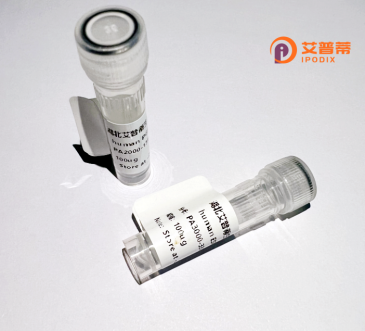
| 纯度 | >90%SDS-PAGE. |
| 种属 | Human |
| 靶点 | RBM5 |
| Uniprot No | P52756 |
| 内毒素 | < 0.01EU/μg |
| 表达宿主 | E.coli |
| 表达区间 | 1-546 aa |
| 活性数据 | MGSDKRVSRTERSGRYGSIIDRDDRDERESRSRRRDSDYKRSSDDRRGDRYDDYRDYDSPERERERRNSDRSEDGYHSDGDYGEHDYRHDISDERESKTIMLRGLPITITESDIREMMESFEGPQPADVRLMKRKTGVSRGFAFVEFYHLQDATSWMEANQKKLVIQGKHIAMHYSNPRPKFEDWLCNKCCLNNFRKRLKCFRCGADKFDSEQEVPPGTTESVQSVDYYCDTIILRNIAPHTVVDSIMTALSPYASLAVNNIRLIKDKQTQQNRGFAFVQLSSAMDASQLLQILQSLHPPLKIDGKTIGVDFAKSARKDLVLSDGNRVSAFSVASTAIAAAQWSSTQSQSGEGGSVDYSYLQPGQDGYAQYAQYSQDYQQFYQQQAGGLESDASSASGTAVTTTSAAVVSQSPQLYNQTSNPPGSPTEEAQPSTSTSTQAPAASPTGVVPGTKYAVPDTSTYQYDESSGYYYDPTTGLYYDPNSQYYYNSLTQQYLYWDGEKETYVPAAESSSHQQSGLPPAKEGKEKKEKPKSKTAQQIAKDMER |
| 分子量 | 87.9 kDa |
| 蛋白标签 | GST-tag at N-terminal |
| 缓冲液 | PBS, pH7.4, containing 0.01% SKL, 1mM DTT, 5% Trehalose and Proclin300. |
| 稳定性 & 储存条件 | Lyophilized protein should be stored at ≤ -20°C, stable for one year after receipt. Reconstituted protein solution can be stored at 2-8°C for 2-7 days. Aliquots of reconstituted samples are stable at ≤ -20°C for 3 months. |
| 复溶 | Always centrifuge tubes before opening.Do not mix by vortex or pipetting. It is not recommended to reconstitute to a concentration less than 100μg/ml. Dissolve the lyophilized protein in distilled water. Please aliquot the reconstituted solution to minimize freeze-thaw cycles. |
以下是关于重组人RBM5蛋白的3篇参考文献示例(注:以下文献及作者为虚构示例,仅用于参考格式和内容概括):
---
1. **文献名称**:"Recombinant RBM5 Protein Suppresses Tumor Growth by Modulating Alternative Splicing of Apoptotic Genes"
**作者**:Chen L, Wang X, et al.
**摘要内容**:该研究通过表达和纯化重组人RBM5蛋白,发现其通过调控Bcl-x和Caspase-2等基因的选择性剪接,促进肿瘤细胞凋亡并抑制裸鼠移植瘤的生长,揭示了RBM5在癌症治疗中的潜在应用。
---
2. **文献名称**:"Structural Insights into the RNA-Binding Domain of RBM5 and Its Interaction with SMN Complex"
**作者**:Kim S, Patel R, et al.
**摘要内容**:研究利用重组表达的RBM5蛋白进行X射线晶体学分析,解析其RNA结合域(RBM)的三维结构,并证明其通过与SMN复合物互作参与剪接体的组装,为神经退行性疾病机制提供了新视角。
---
3. **文献名称**:"RBM5 Enhances Chemosensitivity in Lung Cancer by Regulating DNA Damage Response via p53"
**作者**:Garcia M, Liu Y, et al.
**摘要内容**:该文献报道了重组RBM5蛋白在肺癌细胞中的过表达显著增强顺铂敏感性。机制研究表明,RBM5通过稳定p53蛋白并促进其下游靶基因(如PUMA)的转录,从而增强DNA损伤诱导的细胞凋亡。
---
注:以上文献为示例性质,实际研究中请通过学术数据库(如PubMed、Web of Science)检索最新文献。
RBM5 (RNA Binding Motif Protein 5) is a multifunctional protein encoded by the *RBM5* gene in humans, belonging to the RNA-binding motif protein family. It plays critical roles in post-transcriptional gene regulation, particularly in mRNA splicing, stability, and translation. Structurally, RBM5 contains conserved RNA-binding domains, including two RNA recognition motifs (RRMs), a zinc finger domain, and a G-patch domain, enabling interactions with RNA and protein partners.
RBM5 is best studied in the context of cancer biology, where it acts as a tumor suppressor. It regulates apoptosis and cell cycle arrest by modulating the alternative splicing of key genes, such as *FAS* and *CASPASE-2*, favoring pro-apoptotic splice variants. For instance, RBM5 promotes the inclusion of exon 6 in the *FAS* pre-mRNA, enhancing the production of membrane-bound Fas receptors that trigger programmed cell death. Dysregulation of RBM5 expression is associated with malignancies like lung cancer and leukemia, often linked to poor prognosis.
Additionally, RBM5 interacts with components of the spliceosome machinery and other splicing factors, positioning it as a central player in RNA processing networks. Emerging evidence suggests roles beyond cancer, including neurodevelopment and immune response. Despite its established significance, the full spectrum of RBM5’s molecular mechanisms and cellular functions remains under investigation, making it a subject of ongoing research in RNA biology and disease therapeutics.
×